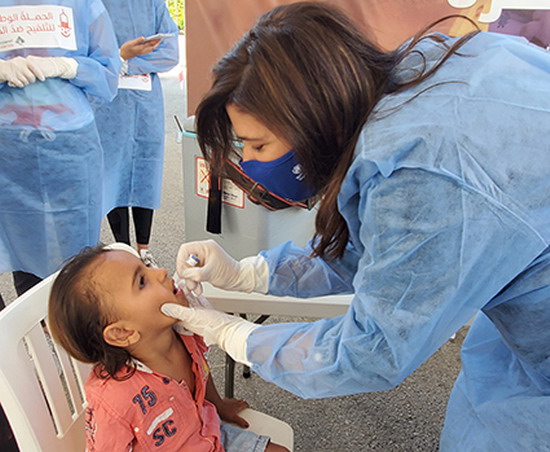
14 October 2020 – The Ministry of Public Health, in partnership with WHO and UNICEF, announced today the beginning of the second phase of the national measles and polio immunization campaign.
The campaign will be piloted until 25 October in Keserwan and Hasbaya districts and will then cover the remaining districts across five governorates (Beirut, Mount Lebanon, Bekaa, South and Nabatieh) from 2 November until the end of the year.
The delivery of immunization services was disrupted by the COVID-19 outbreak, threatening to reverse hard-won progress in reaching children with essential vaccines. Measles immunity has been weakening across Lebanon since 2018 and the COVID-19 pandemic has fueled a significant decline in immunization rates, exacerbating existing disruptions in health care delivery and leaving children more vulnerable to diseases that are preventable through immunization.
Following the completion of the first phase in December 2019 in Akkar, Baalbeck-Hermel and North governorates, that reached 231 200 children, the second phase of the measles and polio campaign will be conducted in the remaining 5 governorates, targeting 364 130 children from the age of 6 months until completion at 10 years old. The vaccination campaign will be conducted in primary health care centres, dispensaries and temporary vaccination sites. As well as being immunized against measles, all children will also receive vaccination with bivalent oral polio vaccine.
The Minister of Public Health, Dr Hamad Hassan, launched the campaign, stressing that “The second phase of the campaign will be conducted in compliance with COVID-19 precautionary measures. All vaccinator teams have been trained on infection, prevention and control measures and equipped with protective personal equipment. Temporary vaccination sites have been chosen in open spaces, and the setting is carefully disinfected to make immunization safe from any contamination. Children and their caregivers will be screened for COVID-19 at vaccination points and any suspected cases referred directly for medical screening. Optimal infection, prevention and control measures will be implemented at all vaccination points to minimize COVID-19 transmission”.
“It is critical not to lose the gains in vaccination coverage that Lebanon has achieved over the past decade. WHO is supporting the vaccination campaign to ensure that children can be spared these avoidable and preventable serious diseases. No child should be left behind. Health protection and disease prevention is a human right,” said Samar Hammoud, Officer-in-Charge, on behalf of WHO Representative in Lebanon, Dr Iman Shankiti.
“In today's context, where COVID-19 has already made the population more vulnerable, it is of the foremost importance that we protect children by boosting their immunity against diseases we know, such as measles or polio, for which we have vaccines that can save lives,” said Yukie Mokuo, UNICEF Representative in Lebanon.
“Although we have experienced new challenges and a setback in the fight against vaccine-preventable diseases because of COVID-19, we have tried to constantly maintain immunization services. Together, we are committed to reaching every child and ensuring vaccination campaigns get back on track.”
Dr Randa Hamadeh, Head of the Primary Health Care Department at the Ministry of Public Health, talked about the importance of the campaign, saying that “1.5 million children die every year from vaccine-preventable diseases. Furthermore, the coronavirus pandemic has caused a decline in child immunization rates, reaching a rate of 47% in Lebanon. There are many challenges to returning vaccination indicators to their level before the pandemic (above 96%), and this can only be achieved through a joint effort between the vaccination programme of the Primary Health Care Department of the Ministry of Public Health, WHO, UNICEF and our partners from the private health sector. This is a time for solidarity and action, so let us work together to reach all children, no matter their nationality. This is their right, and this is our responsibility!”
The national immunization campaign is funded through the generous support of the Kuwait Fund for Arab Economic Development.







